De Amerikaanse schrijver David Vann werd geboren op 19 oktober 1966 op Adak Island, Alaska. Zie ook alle tags voor David Vann op dit blog.
Uit: Klare lucht zwart (Vertaald door Arjaan en Thijs van Nimwegen)
“Haar vader een gouden gelaat in duister. In fakkellicht verschenen boven het water en weer vervaagd. Gelaat van de zon, afstammeling van de zon. Verraad en woede. Vier pluimen langs zijn masker, uiteenspattend licht, als manen.
Zijn schild van vele huiden een uitgeholde duisternis. Essenhouten speer een dunne lijn en dan verdwenen. Het zeil boven hem opgebold als een ossenbuik, gezwollen als een god, hoeven geluidloos in het water beneden.
Niets zal hem weerhouden, zo weet Medea. Hij heeft te veel verloren. Ze kan hem alleen ophouden. Ze bukt zich om een stuk van haar broer te grijpen, een onderarm, sterk en nu vreemd zacht, al afkoelend, en werpt die in zee, bijna zonder geluid, gedempt door het plassen van de roeiriemen.
Ze heeft dit voor Jason gedaan, en ze zal meer doen, dat weet ze. Haar broer uiteengereten aan haar voeten. Zo begint de wereld.
Donker hout in donkerder water, een zee van inkt, een gevoelde maar ongeziene regelmaat, enkel glimpen van brekende golven. Dik hout onder hen, krakend touwwerk.
Dikke touwen van de roerstanders achter haar rug, kreunend onder de druk van de roeren. Ze stijgt en daalt en wentelt bij elke lichte golf, en een ogenblik later herhalen Jason en zijn mannen elke beweging. Allemaal als één samengesmeed, barbaren en haar Minyers. Elke scheepsromp een thuis.
Vlees dat zou moeten zinken maar niet zinkt, een onderarm te klein om op te vallen in fakkellicht in dat duister, maar niettemin gezien. Haar vader die beveelt het zeil te strijken, de riemen in te halen. De grote ossenbuik loopt leeg, houdt geen licht meer vast, verduistert en verschrompelt, de bovenra zakt. Riembladen in een rij hoog boven het water, vangen licht en wijken weer uit, het schip keert.
De romp donker, ongezien, en haar vader daarboven. Nu gebukt, reikend naar zijn zoon.”

David Vann (Adak Island, 19 oktober 1966)
De Britse schrijver Philip Pullman werd geboren op 19 oktober 1946 in Norwich als zoon van een luchtmachtofficier. Zie ook mijn blog van 19 oktober 2010 en eveneens alle tags voor Philip Pullman op dit blog.
Uit:The Book of Dust, La Belle Sauvage
“Malcolm let the canoe drift to a halt and then silently slipped in among the stiff stems and watched as a great crested grebe scrambled up onto the towpath, waddled ungracefully across, and then dropped into the little backwater on the other side.
The reeds were taller than Malcolm was as he sat in the canoe, and if he kept very still, he thought he probably couldn’t be seen. He heard voices behind him, a man’s and a woman’s, and sat like a statue as they walked past, absorbed in each other. He’d passed them further back: two lovers strolling hand in hand, their dæmons, two small birds, flying ahead a little way, pausing to whisper together, and flying on again.
Malcolm’s dæmon, Asta, was a kingfisher just then, perching on the gunwale of the canoe. When the lovers had passed, she flew up to his shoulder and whispered, “The man just along there — watch …”
Malcolm hadn’t seen him. A few yards ahead on the towpath, just visible through the reed stems, a man in a gray raincoat and trilby hat was standing under an oak tree. He looked as if he was sheltering from the rain, except that it wasn’t raining. His coat and hat were almost exactly the color of the late afternoon: he was almost as hard to see as the grebes — harder, in fact, thought Malcolm, because he didn’t have a crest of feathers.
“What’s he doing?” whispered Malcolm.
Asta became a fly and flew as far as she could from Malcolm, stopping when it began to hurt, and settled at the very top of a bulrush so she could watch the man clearly. He was trying to remain inconspicuous, but being so awkward and unhappy about it that he might as well have been waving a flag.”
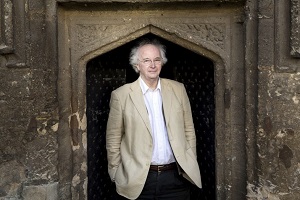
Philip Pullman (Norwich, 19 oktober 1946)
De Guatemalteekse dichter en schrijver Miguel Ángel Asturias werd geboren op 19 oktober 1899 in Guatemala-Stad. Zie ook alle tags voor Miguel Ángel Asturias op dit blog.
Uit: Der Herr President (Vertaald door Jacob Bachmann)
„Pelele riss sogleich die Augen auf, wie einer, der träumt, er falle ins Leere; seine Pupillen öffneten sich weit; im Tiefsten verwundet, begannen seine Tränen zu fließen. Dann schlief er, von der Müdigkeit übermannt, wieder ein. Sein Körper war zusammengefallen, und ein Anflug von Ekel bewegte sein gebrochenes Bewusstsein. Doch kaum eingeschlafen, weckte ihn schon eine andere Stimme. »Mutter …!«
Es war die Stimme Viudas, eines heruntergekommenen Mulatten, der mit dem verzerrten Gesicht einer Alten unter Lachen fortfuhr: »… Mutter des Erbarmens, unsere Hoffnung, Gott möge dich retten, zu dir flehen wir, wir, die Ausgestoßenen, die wir fallen …«
Der Idiot erwachte lachend, es schien, auch ihn mache sein Leid, sein Hunger lachen, und dennoch stach ihn schmerzlich der Spott des Geläch-äch-ächters der Bettler, das die Luſt, die Luſt erfüllte, des Geläch-äch-ächters. Ein Dickbäuchiger mit einem Schnurrbart voller Straßenstaub schnappte nach Luſt; ein Einäugiger pisste sich an vor Lachen und schlug mit dem Kopf gegen die Mauer wie eine junge Ziege. Die Blinden wehrten sich, man könne nicht schlafen bei einem solchen Aufruhr, und Mosco, ein Blinder, dem beide Beine fehlten, rief, diese Art sich zu vergnügen sei weibisch.
Die Blinden hörte man, wie man das Geräusch eines Besens hört, Mosco aber hörte man überhaupt nicht. Wer würde schon auf sein Geplapper achten! »Ich, der die Kindheit in einer Artilleriekaserne verbrachte, wo mich die Hufschläge der Maultiere und die Schritte der Offiziere zum Manne machten, der etwas von Pferden versteht, was mir als junger Mann ermöglichte, meine Drehorgel durch die Straßen zu schleppen! Ich, der, ohne zu wissen wie, die Augen in einer Sauferei verlor, das rechte Bein in einer andern Sauferei, ohne zu wissen wann, und das linke Bein in einer dritten Sauferei, ohne zu wissen wo, bei enem Autounfall…!«
Über die Bettler wurde im ganzen Ort bekannt, dass Pelele beim Hören des Wortes Mutter beinahe den Verstand verlor.“
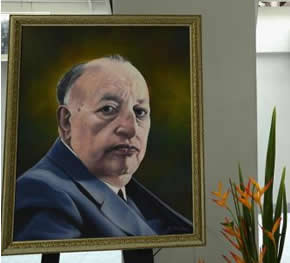
Miguel Ángel Asturias (19 oktober 1899 – 9 juni 1974)
Portret door Maugdo Vásquez, 2014
De Amerikaanse schrijfster Fannie Hurst werd geboren op 19 oktober 1889 in Hamilton, Ohio. Zie ook alle tags voor Fanny Hurst op dit blog.
Uit: The Sturdy Oak
“Genevieve Remington had been called beautiful. She was tall, with brown eyes and a fine spun mass of golden-brown hair. She had a gentle smile, that disclosed white, even teeth. Her voice was not unmusical. She was twenty-three years old and possessed a husband who, though only twenty-six, had already shown such strength of character and such aptitude at the criminal branch of the law that he was now a candidate for the post of district attorney on the regular Republican ticket.
The popular impression was that he would be elected hands down. His address on Alexander Hamilton at the Union League Club banquet at Hamilton City, twenty-five miles from Whitewater (with which smaller city we are concerned in this narrative), had been reprinted in full in the Hamilton City _Tribune_; and Mrs. Brewster-Smith reported that former Congressman Hancock had compared it, not unfavorably, with certain public utterances of the Honorable Elihu Root.
George Remington was an inch more than six feet tall, with sturdy shoulders, a chin that gave every indication of stubborn strength, a frank smile, and a warm, strong handclasp. He was connected by blood (as well as by marriage) with five of the eight best families in Whitewater. Mr. Martin Jaffry, George’s uncle and sole inheritor of the great Jaffry estate (and a bachelor), was known to favor his candidacy; was supposed, indeed, to be a large contributor to the Remington campaign fund. In fact, George Remington was a lucky young man, a coming young man.
George and Genevieve had been married five weeks; this was their first day as master and mistress of the old Remington place on Sheridan Road.”

Fannie Hurst (19 oktober 1889 – 23 februari 1968)
Hamilton, Ohio.
De Engelse dichter, schrijver en essayist James Leigh Hunt werd geboren op 19 oktober 1784 in Southgate, Middlesex. Zie ook mijn blog van 19 oktober 2010 en ook alle tags voor Leigh Hunt op dit blog.
To A Child During Sickness
Sleep breathes at last from out thee,
My little patient boy;
And balmy rest about thee
Smooths off the day’s annoy.
I sit me down, and think
Of all thy winning ways;
Yet almost wish, with sudden shrink,
That I had less to praise.
Thy sidelong pillowed meekness;
Thy thanks to all that aid;
Thy heart, in pain and weakness,
Of fancied faults afraid;
The little trembling hand
That wipes thy quiet tears,—
These, these are things that may demand
Dread memories for years.
Sorrows I ‘ve had, severe ones,
I will not think of now;
And calmly, midst my dear ones,
Have wasted with dry brow;
But when thy fingers press
And pat my stooping head,
I cannot bear the gentleness,—
The tears are in their bed.
Ah, first-born of thy mother,
When life and hope were new;
Kind playmate of thy brother,
Thy sister, father too;
My light, where’er I go;
My bird, when prison-bound;
My hand-in-hand companion—No,
My prayers shall hold thee round.
To say, “He has departed”—
“His voice”—”his face”—is gone,
To feel impatient-hearted,
Yet feel we must bear on,—
Ah, I could not endure
To whisper of such woe,
Unless I felt this sleep insure
That it will not be so.
Yes, still he ’s fixed, and sleeping!
This silence too the while,—
Its very hush and creeping
Seem whispering us a smile;
Something divine and dim
Seems going by one’s ear,
Like parting wings of cherubim,
Who say, “We ‘ve finished here.”
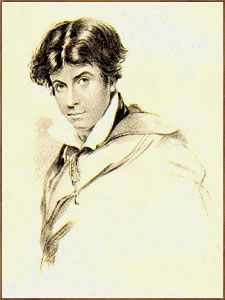
Leigh Hunt (19 oktober 1784 – 28 augustus 1859)
Gravure door H. Meyer naar een tekening van J. Hayter, 1822
De Surinaamse schrijver Nardo Aluman (eig. Ronald Renardo Aloema) werd geboren in Christiaankondre op 19 oktober 1946. Zie ook alle tags voor Nardo Aluman op dit blog en eveneens mijn blog van 19 oktober 2010
Uit: Julawai / De strijd tussen goed en kwaad
“Elke keer als een zieke met succes was behandeld, was er een feestje in het dorp. Volgens de regels van de pyjai mag geen betaling voor verleende hulp aangenomen worden. In plaats daarvan werd er een dankfeest gehouden, waarbij gegeten en gedronken werd. Op zo’n feest werd tot de Allerhoogste, Tamusi, gebeden en dank uitgebracht voor het welzijn van de bevolking.
Op het moment dat zo’n feest zijn hoogtepunt bereikte, kwam Julawai met zijn gezin aanvaren. Al van ver hoorden ze dat de bevolking in een prettige stemming verkeerde.
Het liep tegen de avond toen ze hartelijk door de Byjai van het dorp werden ontvangen. Enkele vrouwen brachten direct zoet-zure kasiri (cassavedrank) voor de gasten. Hierna werden ze vergast op een heerlijke tuma-atjupo (vissoep).
Na deze welkome maaltijd had Julawai een uitgebreid gesprek met de Byjai, onder het genot van kasiri en een ulemari (sigaar uit boombast). De nacht was al ver gevorderd, toen Julawai zich realiseerde dat zijn vrouw en kinderen allang waren gaan rusten. Hij besloot toen ook zijn hangmat op te zoeken.
Julawai stond op. Hij was misschien wel de mooiste man van het gebied. Hij was licht van kleur, groot gebouwd en sterk. Vier stuks pingo (bosvarken) op zijn schouders was niets voor hem. Hiermee kon hij zonder moeite kilometers onafgebroken doorlopen. Iedereen had dan ook respect voor hem. En de mensen hielden van hem omdat hij nooit ruzie maakte.
Toen Julawai in zijn logeerkamp aankwam, was zijn gezin al in diepe rust. Hij voelde zich een beetje moe en dronken, maar besloot om toch een koud bad te nemen in de kreek. Natuurlijk moest hij dit eerst aan zijn vrouw zeggen. Ze vond het een goed idee, maar zei dat hij wel direct terug moest komen. Ook vond ze dat hij beter een olielampje mee kon nemen, maar Julawai antwoordde dat het maar een korte afstand was.”
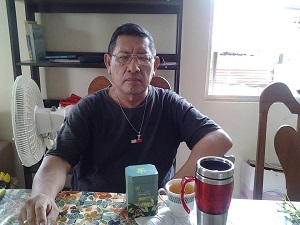
Nardo Aluman (Christiaankondre, 19 oktober 1946)
De Amerikaanse schrijver Andrew Vachss werd geboren op 19 oktober 1942 in New York. Zie ook alle tags voor Andrew Vachss op dit blog en eveneens mijn blog van 19 oktober 2010
Uit: Haiku
“The priests had taught us that each man has a personal haiku, a haiku that must emerge from within. A master of haiku might be commissioned to produce thousands in his lifetime. But only one could truly express his own spirit.
The priest who told me this later showed me his own haiku. When I attempted to show my respect for his achievement, he gently explained that the haiku was not finished. He would continue to refine it, forever seeking perfection.
“When will it be finished, master?” I asked.
“Perfection cannot be achieved by men,” he told me. “Our highest calling is the pursuit of perfection. My haiku will be finished when I die, but never will it be perfect.”
When Chica died—no, when my departure from The Path forfeited her life—I shredded the haiku I had been composing for dozens of years.
Now I have begun another. One of truth. I have rewritten it endlessly since.
It is inadequate. I continue to struggle. Perhaps I will never be able to express what is in me. I cannot know how much time is left for me to do this. I know only that I must atone before I leave, or I shall enter the other plane carrying the haiku of a man without honor.
I understand that renunciation of worldly goods is not true atonement. Many do this, each for his own reasons. Mine is that I must return to the man I was, and so I must focus all my being on that task alone.
I have started my walk. May it become the walk of the warrior I had once imagined myself to be.
I must walk until my haiku reflects the spirit of a man who honors his mother’s love, for only then may I call Chica “daughter” when I see her again.”

Andrew Vachss (New York, 19 oktober 1942)
De Britse schrijver John le Carré werd geboren op 19 oktober 1931 in Poole, Dorset, Engeland. Zie ook alle tags voor John le Carré op dit blog.
Uit:A Legacy of Spies
“What follows is a truthful account, as best I am able to provide it, of my role in the British deception operation, code-named Windfall, that was mounted against the East German Intelligence Service (Stasi) in the late 1950s and early ’60s, and resulted in the death of the best British secret agent I ever worked with, and of the innocent woman for whom he gave his life.
A professional intelligence officer is no more immune to human feelings than the rest of mankind. What matters to him is the extent to which he is able to suppress them, whether in real time or, in my case, 50 years on. Until a couple of months ago, lying in bed at night in the remote farmstead in Brittany that is my home, listening to the honk of cattle and the bickering of hens, I resolutely fought off the accusing voices that from time to time attempted to disrupt my sleep. I was too young, I protested, I was too innocent, too naïve, too junior. If you’re looking for scalps, I told them, go to those grandmasters of deception, George Smiley and his master, Control. It was their refined cunning, I insisted, their devious, scholarly intellects, not mine, that delivered the triumph and the anguish that was Windfall. It is only now, having been held to account by the Service to which I devoted the best years of my life, that I am driven in age and bewilderment to set down, at whatever cost, the light and dark sides of my involvement in the affair.
How I came to be recruited to the Secret Intelligence Service in the first place — the “Circus” as we Young Turks called it in those supposedly halcyon days when we were quartered, not in a grotesque fortress beside the River Thames, but in a fustian Victorian pile of red brick, built on the curve of Cambridge Circus — remains as much of a mystery to me as do the circumstances of my birth; and the more so since the two events are inseparable.”
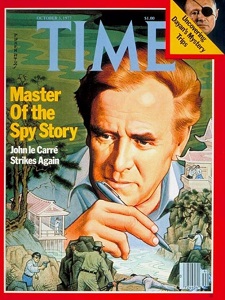
John le Carré (Poole, 19 oktober 1931)
Op de cover van Time in 1977
De Australische dichter Adam Lindsay Gordon werd geboren op 19 oktober 1833 op de Azoren. Zie ook alle tags voor Adam Lindsay Gordon op dit blog. en eveneens mijn blog van 19 oktober 2010.
An Exile’s Farewell
The ocean heaves around us still
With long and measured swell,
The autumn gales our canvas fill,
Our ship rides smooth and well.
The broad Atlantic’s bed of foam
Still breaks against our prow;
I shed no tears at quitting home,
Nor will I shed them now!
Against the bulwarks on the poop
I lean, and watch the sun
Behind the red horizon stoop —
His race is nearly run.
Those waves will never quench his light,
O’er which they seem to close,
To-morrow he will rise as bright
As he this morning rose.
How brightly gleams the orb of day
Across the trackless sea!
How lightly dance the waves that play
Like dolphins in our lee!
The restless waters seem to say,
In smothered tones to me,
How many thousand miles away
My native land must be!
Speak, Ocean! is my Home the same
Now all is new to me? —
The tropic sky’s resplendent flame,
The vast expanse of sea?
Does all around her, yet unchanged,
The well-known aspect wear?
Oh! can the leagues that I have ranged
Have made no difference there?
How vivid Recollection’s hand
Recalls the scene once more!
I see the same tall poplars stand
Beside the garden door;
I see the bird-cage hanging still;
And where my sister set
The flowers in the window-sill —
Can they be living yet?
Let woman’s nature cherish grief,
I rarely heave a sigh
Before emotion takes relief
In listless apathy;
While from my pipe the vapours curl
Towards the evening sky,
And ‘neath my feet the billows whirl
In dull monotony!
The sky still wears the crimson streak
Of Sol’s departing ray,
Some briny drops are on my cheek,
‘Tis but the salt sea spray!
Then let our barque the ocean roam,
Our keel the billows plough;
I shed no tears at quitting home,
Nor will I shed them now!
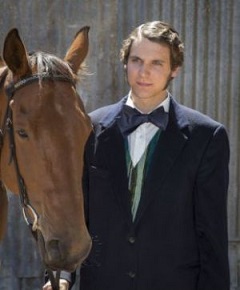
Adam Lindsay Gordon (19 oktober 1833 – 24 juni 1870)
Jakin Manser als Adam Lindsay Gordon in het docudrama “Rider and Writer” uit 2014
